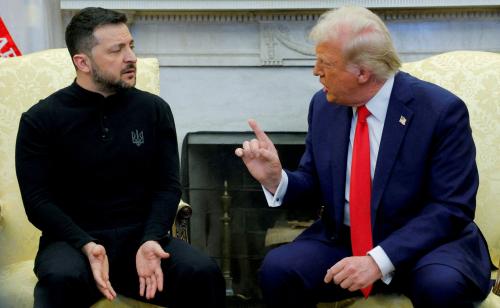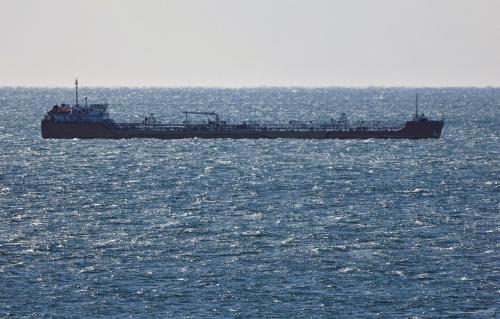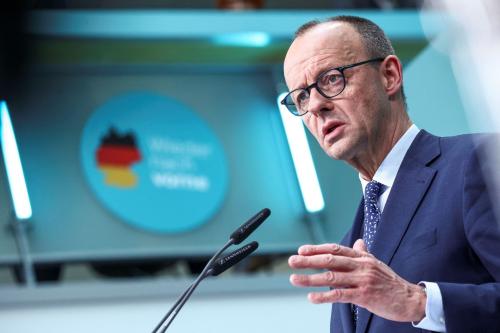Experts will participate in a panel discussion on “Putin’s Next Act,” on Wednesday, April 4, co-sponsored by the Center on the U.S. and Europe at Brookings and the Heinrich Böll Foundation. Learn how to attend this event here. As expected, Putin won re-election on March 18. Keep up-to-date with the latest analysis on Russia from Brookings experts.
Russia is center stage in word affairs thanks in part to its military presence in Syria and its alleged meddling in the 2016 U.S. presidential election. But now, Russians are preparing to head to the ballot box on March 18 to cast their votes in a presidential election. The outcome—Vladimir Putin’s re-election as Russia’s president—isn’t in doubt. After the election, the world will continue to reckon with an increasingly assertive Russia. That was made even more clear on March 1, Putin, dedicated a third of his state of the union speech to introducing new Russian weapon systems, with a clear emphasis on the country’s nuclear arsenal. With Putin certain to remain firmly in charge at the Kremlin, we asked some Brooking scholars to recommend books and articles to read to better understand him, his regime, and his country.
 Torrey Taussig, a post-doctoral fellow in the Center on the U.S. and Europe at Brookings, recommends a recent conversation among eight Brookings experts on an effective U.S. strategy for countering Russian aggression and deterring future offenses. “In a time when Putin shows no signs of leaving the stage,” Taussig says, “experts discuss how the prospects for much-needed economic reform and modernization remain limited as Putin and elites view reforms as a threat to their political survival and personal wealth.” Download and read “Restoring Equilibrium: U.S. Policy Options for Countering and Engaging Russia.”
Torrey Taussig, a post-doctoral fellow in the Center on the U.S. and Europe at Brookings, recommends a recent conversation among eight Brookings experts on an effective U.S. strategy for countering Russian aggression and deterring future offenses. “In a time when Putin shows no signs of leaving the stage,” Taussig says, “experts discuss how the prospects for much-needed economic reform and modernization remain limited as Putin and elites view reforms as a threat to their political survival and personal wealth.” Download and read “Restoring Equilibrium: U.S. Policy Options for Countering and Engaging Russia.”
Taussig also recommends an article she co-authored with Alina Polyakova (whose recommendations appear below), that was published originally in Foreign Affairs: “The autocrat’s Achilles’ heel.” As Taussig explains:
In this article, Alina Polyakova and I discuss the reasons why Putin’s consolidation of power may be a strategic error that comes back to haunt him. While consolidating personal control may enhance an autocrat’s power in the short-term, this process can eventually exacerbate internal weaknesses that undermine their rule.
As the U.S. weighs its approach to Russia in a new era of great power politics, policymakers will need to take into account how the internal domestic tensions inherent to personalist systems will affect Putin’s foreign policy agenda.
James Kirchick, a visiting fellow in Foreign Policy at Brookings, recommends Mr. Putin: Operative in the Kremlin, by Fiona Hill and Clifford Gaddy.
“Today, Vladimir Putin has become the greatest challenge to European security and the global world order in decades. Russia’s 8,000 nuclear weapons underscore the huge risks of not understanding who Putin is. Featuring five new chapters, this new edition dispels potentially dangerous misconceptions about Putin and offers a clear-eyed look at his objectives. It presents Putin as a reflection of deeply ingrained Russian ways of thinking as well as his unique personal background and experience.”
Kirchick is also the author of The End of Europe: Dictators, Demagogues, and the Coming Dark Age.
James Kirchick shows us the shallow disingenuousness of the leaders who pushed for “Brexit”; examines how a vast migrant wave is exacerbating tensions between Europeans and their Muslim minorities; explores the rising anti-Semitism that causes Jewish schools and synagogues in France and Germany to resemble armed bunkers; and describes how Russian imperial ambitions are destabilizing nations from Estonia to Ukraine. With President Trump now threatening to abandon America’s traditional role as upholder of the liberal world order and guarantor of the continent’s security, Europe may be alone in dealing with these unprecedented challenges.
Alina Polyakova is a David M. Rubenstein Fellow in the Foreign Policy program and co-author of the new report, “The future of political warfare: Russia, the West, and the coming age of global digital competition.” She and her co-author, Brookings Nonresident Senior Fellow Spencer Boyer, outline the current state of play in Russia’s political warfare, identify emerging threats, and argue for greater information sharing between trans-Atlantic governments and the private sector.
Polyakova suggests a number of books (in addition to Mr. Putin), including:
 The New Tsar: The Rise and Reign of Vladimir Putin, by Steven Lee Myers.
The New Tsar: The Rise and Reign of Vladimir Putin, by Steven Lee Myers.
“In this gripping narrative of Putin’s rise to power, Steven Lee Myers recounts Putin’s origins–from his childhood of abject poverty in Leningrad to his ascent through the ranks of the KGB, and his eventual consolidation of rule in the Kremlin.”
 The Red Web: The Kremlin’s Wars on the Internet, by Andrei Soldatov and Irina Borogan.
The Red Web: The Kremlin’s Wars on the Internet, by Andrei Soldatov and Irina Borogan.
“The Red Web is a groundbreaking history of the Kremlin’s massive online-surveillance state that exposes just how easily the internet can become the means for repression, control, and geopolitical warfare. In this bold, updated edition, Andrei Soldatov and Irina Borogan offer a perspective from Moscow with new and previously unreported details of the 2016 hacking operation, telling the story of how Russia came to embrace the disruptive potential of the web and interfere with democracy around the world.”
 Nothing Is True and Everything Is Possible: The Surreal Heart of the New Russia, by Peter Pomerantsev.
Nothing Is True and Everything Is Possible: The Surreal Heart of the New Russia, by Peter Pomerantsev.
“When British producer Peter Pomerantsev plunges into the booming Russian TV industry, he gains access to every nook and corrupt cranny of the country. He is brought to smoky rooms for meetings with propaganda gurus running the nerve-center of the Russian media machine, and visits Siberian mafia-towns and the salons of the international super-rich in London and the US. As the Putin regime becomes more aggressive, Pomerantsev finds himself drawn further into the system.”
The Brookings Institution Press has also published numerous titles on Russia and Putin, including the aforementioned Mr. Putin: Operative in the Kremlin. See also:
Beyond NATO: A New Security Architecture for Eastern Europe, by Michael O’Hanlon
“Michael O’Hanlon argues that now is the time for Western nations to negotiate a new security architecture for neutral countries in eastern Europe to stabilize the region and reduce the risks of war with Russia. He believes NATO expansion has gone far enough. The core concept of this new security architecture would be one of permanent neutrality.”
 The New Autocracy: Information, Politics, and Policy in Putin’s Russia, edited by Daniel Treisman.
The New Autocracy: Information, Politics, and Policy in Putin’s Russia, edited by Daniel Treisman.
“The result of a two-year collaboration between top Russian experts and Western political scholars, Autocracy explores the complex roles of Russia’s presidency, security services, parliament, media and other actors. The authors argue that Putin has created an “informational autocracy,” which relies more on media manipulation than on the comprehensive repression of traditional dictatorships.”
Imperial Gamble: Putin, Ukraine, and the New Cold War, by Marvin Kalb
“Imperial Gamble examines how Putin reached [the conclusion that Ukraine’s opposition constituted an existential threat to Russia] by taking a critical look at the recent political history of post-Soviet Russia. It also journeys deep into Russian and Ukrainian history to explain what keeps them together and yet at the same time drives them apart.”
Russia and the New World Disorder, by Bobo Lo.
“In this groundbreaking book, renowned scholar Bobo Lo analyzes the broader context of the [Russian annexation of Crimea] by examining the interplay between Russian foreign policy and an increasingly anarchic international environment. He argues that Moscow’s approach to regional and global affairs reflects the tension between two very different worlds—the perceptual and the actual.”
Visit our topic page for more research on Russia, including:
- Another arms race? No and nyet, by Maggie Tennis and Strobe Talbott
- Missiles of March: A political means of last resort for Putin, by Pavel Baev
- A post-American Europe and the future of U.S. strategy, by Thomas Wright
- Putin: Turning neighbor into adversary, by Steven Pifer
The Brookings Institution is committed to quality, independence, and impact.
We are supported by a diverse array of funders. In line with our values and policies, each Brookings publication represents the sole views of its author(s).









Commentary
Brookings experts’ Russia reading list
March 14, 2018